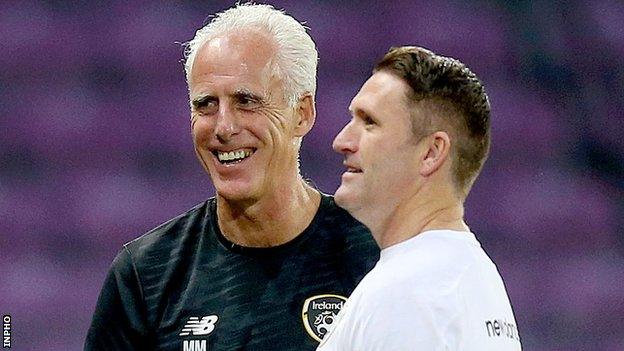Football Association of Ireland: Governing body's debts now exceed £68m, AGM told
- Published

FAI chairman Roy Barrett says the Republic of Ireland's football governing body should aspire to be the country's "leading sporting organisation"
The Football Association of Ireland's AGM heard the governing body's liabilities have increased to over £68m as it continues attempts to navigate its way out of the John Delaney era.
That debt figure was up to December 2019 and is certain to have risen further in the interim amid Covid-19.
Despite that chairman Roy Barrett said the FAI should aspire to be Ireland's "leading sports organisation".
"That's what we will achieve," he told delegates at the virtually-held AGM.
"We have a sport which is represented internationally and competes on a global basis, which many of our other competing sports don't.
"What's got in the way the last couple of years are the largely reputational issues of the FAI itself and all the things that have happened.
"We're committed to improving that. We're committed to putting in place all of the governance structures and all of the management structures and appropriate operating structures in the FAI to enable the staff within the FAI to feel proud of the organisation, and enable people outside the staff to feel proud of the organisation; to have trust and confidence in it.
"I think both Gaelic and rugby have good reputations and those reputations are well deserved. I just think we can be as good if not better."
'Reputational damage hugely significant'
Barrett admitted that the "reputational damage to the association has been hugely significant".
"That's actually not going to change. What will change are the actions and behaviours of the organisation. There are a lot of new people involved who have nothing to do what went on in the past."
Mention of Delaney was conspicuous by its absence apart from a reference to his severance payment of £418,000 which the FAI maintained was a saving in terms of the additional £1.8m which it could have had to pay the former long-serving chief executive.
New chief executive Jonathan Hill echoed Barrett's sentiments when he spoke of the aim to build "a more trusted and a more respected FAI".
"We must remain relevant," said the former commercial director of the English FA, who was appointed in October.
"The pace of change is intense, the complexity of change is significant."

Robbie Keane (right) remains under contract to the FAI even though there has been no obvious role for him since Mick McCarthy's departure from the manager's position
Keane still an FAI employee
But while 'change' was the buzz word of the AGM, the legacy of the Delaney era remained ever-present.
The 120 delegates were told that the FAI will have to pay Sports Direct just over £90,000 per month in loan repayments until October 2025 arising from a sponsorship deal struck in 2018 when Delaney was in charge.
The deal was due to start in 2020 but the FAI sought an early payment of £5.87m and this is now having to be paid back after the deal was terminated following Delaney's departure.
Another financial hit which the FAI is having to deal with involves the four-year contract handed to Robbie Keane when he was named as assistant to then new international boss Mick McCarthy in 2018.
Keane remains contracted to the FAI even though there is no obvious role for the country's record goalscorer following Stephen Kenny's arrival and appointment of his own backroom team.
"Robbie is still on the books on a full contract," added chairman Barrett.
"There is some engagement now which will go through (new chief executive Hill). It's possible (he could get a different role). I just don't know the answer to that question."